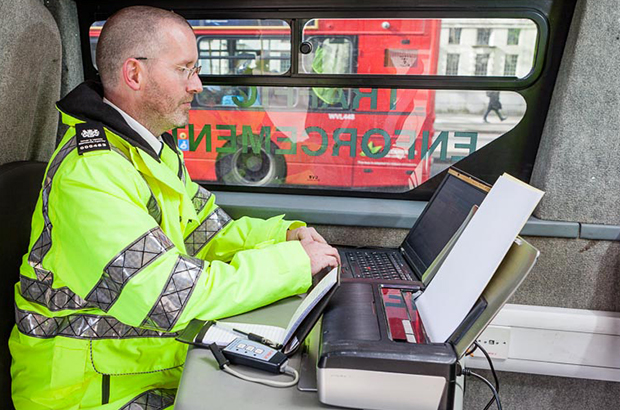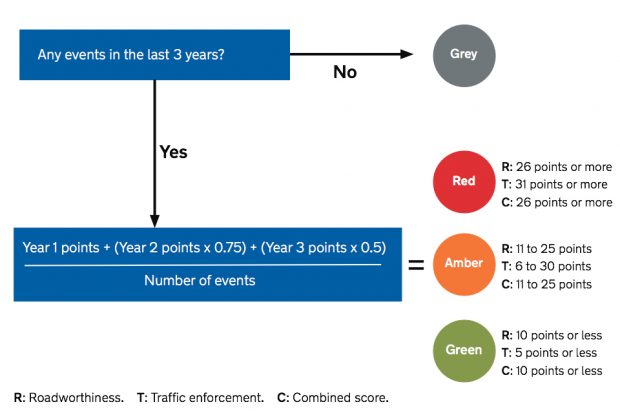
We use the Operator Compliance Risk Score (OCRS) system to help decide which vehicles should be stopped at the roadside.
It calculates the risk of an operator not following the rules on roadworthiness (the condition of its vehicles) and traffic - for example, drivers’ hours. It’s more likely that your vehicles will be inspected if your OCRS is high.
We’ve reviewed the OCRS system through our complaints and enquiries service, and from feedback from traffic and vehicle examiners. We wanted to find out how the system worked in practice.
As a result, we’ve introduced some changes and operators can request a report from today (Tuesday 6 December 2016).
The new combined score
We've added a new combined score to the OCRS system. This will combine your roadworthiness and traffic scores and will appear in your OCRS reports. You'll still be able to view your individual roadworthiness and traffic scores.
This new score will help us concentrate our roadside targeting on operators who have the highest risk scores. Vehicle and traffic examiners will use the new combined score to determine which vehicles to inspect.

By protecting the public from unsafe drivers and vehicles it’ll help keep you safe on Britain’s roads.
Removing the 'straight to red' trigger
The 'straight to red' trigger puts operators in the red band following a prosecution or a ‘most serious infringement' (MSI). We've now removed this.
In the future, we’ll continue to issue operators with OCRS points for most serious offences and prosecutions but they won’t automatically be placed into the red band when this happens.
Verbal warnings during a roadside check
If a driver is issued with a verbal warning during a roadside check, the operator’s OCRS score will not be affected. Instead, this will now be shown on the operator’s OCRS report as a clear inspection - unless the traffic examiner finds other offences and issues a prohibition or fixed penalty.
Lowering points for prosecution cases and band 5 offences
We’ve also lowered the points given for prosecution cases and band 5 offences (such as failing to record data on a tachograph) from 500 to 300.
The points for other bands won't change. So for example, band 4 offences will still get 200 points.
More information
You’ll find more detailed information about the changes in our OCRS system guidance, including how the combined score is calculated.
10 comments
Comment by Alan Barber posted on
I am all for DVSA making sure Operators are sticking to their commitment to run safe vehicles but one thing I have had come up is how you can receive a delayed prohibition for a tyre.
If the tyre is illegal the vehicle should receive an immediate prohibition, if its not illegal it should be an advisory and no PG9 raised. If you have been given a delayed prohibition for a tyre and you continue with your journey and the tyre then failed who is responsible ? The Driver or the DVSA that have allowed you to carry on.
To me, if its illegal immediately prohibit it, if its not illegal then advise but a delayed should not be given for a component that could then fail. To me delayed prohibitions are being given just to increase your score.
Comment by Simon Phillips posted on
One interesting anomaly with the OCRS system is that it can change from Green to Amber (or even possibly into Red) without any further roadside encounters if previous 'clear' encounters are erased after 3 years, thus causing the average score to subsequently go up. It happened to us and only went back down to Green again after a further clear encounter.
The other point I'd like to make is that despite being a Green operator, we are located near a DVSA checkpoint and being Green doesn't seem to stop us from being stopped there - 12 times in the last 3 years. We don't mind being stopped and checked but the last 2 encounters, one in October 2016 and one in November 2016, took over 45 minutes each on both occasions. This did have a commercial impact on our business and I thought one of the major benefits of the OCRS system was, to quote DVSA, "To reduce the burden on the compliant".
Finally, I'd just like to say, that I think that the DVSA are doing a good job and that road safety must always remain paramount. Thank you
Comment by Kevin Goodwin posted on
This change is welcomed, however I would question the scores, the reason being (assuming I have read it correctly) - No offences for 3 years results in Grey, should you have a band 4 offence in the 3rd year you will receive 200 points x by 0.5 = 100 points divided by the number of events (1) will leave you a point score of 100, which will result in the operator being placed in the red.
Unless lower points are given for offences the chances are that many operators will again be immediately placed in the red for 1 offence.
Comment by John Huke posted on
A positive move by the DVSA but one issue I believe DVSA should look at is prohibitions for an under inflated tyre, our company has designed a A4 size defect book that has space to report several checks through the day, basically every time they go off road and you can do these checks and still pick up a puncture on the road, get stopped by dvsa an officer hits the tyres with a hammer and you can get a prohibition for 1 tyre out of 12 under inflated, driver pumps it up straight away and it gets lifted within minutes, I think it's a bit heavy handed
Comment by David Ward posted on
I'm with you all the way Andrew. But, best of luck getting anyone to look into it. Don't hold your breath is my advice.
Comment by John Joyce posted on
A lot of good changes. There needs to be a system in place and these changes are a positive move.
Comment by Colin Rowe posted on
Seems a fair change. Straight to red was very hard for large operators with one delinquent driver. Great news.
Comment by Ron Smith posted on
Thank you for this review. The straight to red trigger was, in my opinion, harsh, especially if this was a first offence.
Comment by ANDREW FREDERICK stephenson posted on
FORGET THIS HOW DOES ONE REPORT PEOPLE OPERATING WITH OUT ANY OP RATERS LICENCE, IM SICK OF SEEING ONE
OPERATING WITH OUT A LICENCE OR TACO IN BRADFORD.
Comment by Thomas (DVSA) posted on
Hi Andrew,
Can you please send details of this to enquiries@vosa.gov.uk. We can then look into this for you.
Regards
Thomas